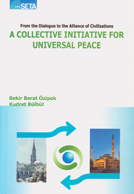The Alliance of Civilizations initiative is one of the major attempts of our day to bring different cultures and civilizations together. Like all great ideas, it has arisen out of a need to address a problem: the problem of recognizing cultural differences without denying their existence on the one hand, and without turning them into causes of conflict and war, on the other. In a world in which all of us passionately seek a moral and political center, the need for uniting rather than dividing is obvious. Reaching that goal, however, remains a daunting task.
In no period of recorded history have human beings known about different cultures as much as we do today. Thanks to the pervasive nature of globalization, what happens in Washington, London or France has an immediate impact on what positions are taken in Istanbul, Cairo or Kuala Lumpur and vice versa. Our global public space is so powerful yet also so elusive that it leads many to believe that more information brings more understanding. Getting to know each other from close up, however, is not always a smooth and easy experience. It may result in some pleasant surprises and enriching experiences. Yet it may also result in disappointment, frustration and mistrust. Given the current state of relations between different cultures and especially Muslim and Western societies, we are doomed when we refuse to recognize each other. Yet, we also run up against tremendous difficulties when we show the courage and honesty of knowing each other closely for there is too long a history of doubt, mistrust and refusal.
Today, living together is no longer confined to living in the same city or country. Geographical and political boundaries turn into trivial details when it comes to the shared space of thought, imagination and feeling. Living together becomes a burden and threat when this space, so dear to the heart and mind of every human being, is ridiculed, underestimated, attacked or destroyed. It is at such moments of violence that we loose our resolve to defend the middle path and begin to see extremism of various kinds, i.e., economic, military, political, religious, cultural, as a refuge and basis for our oppositional identities. This is where Muslim sentiments collide with those of the West, ordinary people with sound minds become suspects or enemies, what is called ‘East’ becomes a powerful category only to the exclusion of the ‘West’. Our so-called information age gives us not understanding but misinformed intellects and hardened souls. As we experience it today, the form and scale of living together is a new phenomenon in the history of humanity. In no other period in history have human beings been so open and vulnerable to what others think and do. Blessed ignorance or calculated indifference is only a luxury which comes at a high cost. Neither a New Yorker can ignore the Middle East peace process nor can an Egyptian turn a blind eye to the uninspiring and tasteless work of few Danish cartoonists. Whether we see it as a challenge or threat, we live together and try to make sense of our lives through the lenses of such a real and demanding experience. The dazzlingly fast and diverse confluence of different cultural, ethnic and religious communities is a unique fact which all of us across the globe are trying to accommodate. The mass migration and relocation of communities in large numbers over relatively short periods of time changes the social fabric of host countries with far-reaching consequences for their societal compositions, economic adjustments and political systems. Not only the migration of individuals and communities as real b










